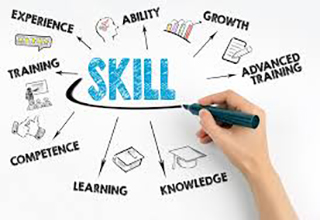Life skill Development of Autistic Children Following Education Therapy in Specialized Schools

Abstract:
Life skill development is a comprehensive approach to measuring
skills outcome that evaluates an individual’s level of skills that develops. A cross
sectional study was done among purposively selected 158 respondents and age range
of autistic child was 5 to 20 years old who attended PROYASH specialized school-based
treatment in Dhaka city from January to December 2016. All the respondents were
school teachers, class teacher assistant and parents of 5 to 20 years old previously
diagnosed autistic children with male predominance which was almost 68%. Among 158
cases more than 90% child were diagnosed as autistic within 2 to 3 years of e and
99.4% autistic children get formal education. After getting special intervention
in specialized school 61.39% could utter words but couldn’t make sentences, 37.97%
could communicate with sentences and 0.63% had no verbal communication. In this
study 99.4% children get the treatment for autism. Medicines also help in the regeneration
of nerves. In this study 61.4% autistic child only utter words, 38% child make sentences
and only 0.6% with autism do not talk at all after therapy. The study identified
the apparent situation of skills and relationship among variables and daily living
skills could be improved by intervention therapies like SCERTS (Social communication,
Emotional regulation, Transactional support) model, Applied Behavior Analysis (ABA),
Auditory Integration Training (AIT), Daily Life Therapy, THE HANDLE Institute (Holistic
Approach To Neurological Development and Learning Efficiency), Integrated Play Therapy,
Picture Exchange Communication Systems (PECS) and so on.
Keywords: Life
skill Development, Autistic Children, Education Therapy.
References:
[1]. iken, L. S., West, S.
G. (1991) Multiple regression: Test ingand interpreting interaction. Newbury Park,
CA: Sage, Odessa, FL. Psycological assessment recourses
[2]. American Psychiatric
Association. Diagnostic and Statistical Manual
of Mental Disorders. 5th ed. Washington, DC: American Psychiatric Association
(2013).
[3]. American Psychiatric
Association. (2000). Diagnostic and Statistical manual of mental disorder: DSM-IV-TR
(4thed.Text revision).Washington,DC:
[4]. American Psychiatric
Association. Baron, M., Kenny, A. (1986).
[5]. Alice S. Carter. Predictors
and Course of Daily Living Skills Development in Toddlers with Autism Spectrum Disorders
(2014); 44(2): 256-263.
[6]. Autism overview, International
Centre for Autism Research and Education.
[7]. Bernard-Opitz, V. Kwook,
K-W. Sapuan, S. Epidemiology of autism in Singapore: findings of the first autism
survey. Int J of Rehab Research. 2001; 24(1):
1-6.
[8]. Costa. P.T; McCarae. R. R (1989). The NEO-PI/NEO-FFI
manual supplement.
[9]. CDC. Prevalence of Autism
Spectrum Disorder---Autism and Developmental Disabilities Monitoring Network,14
Sites, United States, 2008.Surveill Summ, MMWR. March 30,2012.61(SS03);1-19.
[10]. Carper RA, Courchesne
E. Inverse correlation between frontal lobe and cerebellum sizes in Children with
Autism. Brain 2000; 123: 836-844.
[11]. Coskunpinar A, Davis
C. Psychological Health of Parents of Children with Autism Spectrum Disorders. Winter 2009; 25 1044-1921.
[12]. Eikeseth, S., Smith,
T., Jahr, E., & Eldevik, S. (2007). Outcome for children with autism who began
intensive behavioral treatment between ages 4 and 7: A comparison-controlled study.
Behavior modification, 31(3), 264-278.
[13]. Elizabeth A. Laugeson, Jennifer Sanderson, The ABC’s of Teaching
Social Skills to Adolescents with Autism Spectrum Disorder in the Classroom: The
UCLA PEERS ® Program, Journal of Autism and Developmental Disorders September 2014, Volume 44, Issue 9, pp 2244–2256.
[14]. Hirtz DG, Wagner A,
Filipek PA. Autistic Spectrum Disorders. In: Swiman KF, Asnwal S, Ferriero DM. Editor,
Pediatric Neurology: Principles and Practice, Vol-1, Philadelphia; Elsevier; 2006.
P. 905-935.
[15]. Jordanian Department
for Statistics, Journal of Intellectual and Developmental Disability,3 4(1),
pp.10-16.
[16]. Johnson CP, Myers SM.
Identification and evaluation of children with autism spectrum disorders. American Academy of Pediatrics. 1 Jul 2009; 120,
1183-1215.
[17]. Karen L. Pierce, Laura
Schreibman. Teaching Daily Living Skills to Children with Autism in Understanding
Settings Through Pictoral Self-Management (1994); 471-481.
[18]. Karen SiffExkorn, The
Autism Sourcebook.
[19]. Lord, C., E. H. Cook,
B. L. Leventhal and D. G. Amaral (2000). "Autism spectrum disorders."
Neuron 28(2): 355-363.
[20]. Lynn Kern Koegel, Robert
L. Koegel, Christine Hurley and William D. Frea. Improving Social Skills and Disruptive
Behavior in Children with Autism Through Self-Management (1992); 341-353.
[21]. Myers S. M, Johnson
C.P, Management of Children with Autism Spectrum Disorders. Official J of the Am Ac of Paediatrics 2007;120:1162-1175.
[22]. Nair MKC. Autism Spectrum
Disorders. Indian Paediatrics.2004; 41:541-542.
[23]. Odessa, FL.: Phycological
assessment recourses.
[24]. Rahman Md Mizanur. Autism
Spectrum Disorder. J Bangladesh CollPhysSurg 2010;28:143-144.
[25]. Rahman, A., G. Divan,
S. U. Hamdani, V. Vajaratkar, C. Taylor, K. Leadbitter, C. Aldred, A. Minhas, P.
Cardozo and R. Emsley (2016). "Effectiveness of the parent-mediated intervention
for children with autism spectrum disorder in south Asia in India and Pakistan (PASS):
a randomised controlled trial." The Lancet Psychiatry 3(2): 128-136.
[26]. Reini Cordier, Renee
Speyer, Yu-Wei Chen, Sarah Wilkes-Gillan, Ted Brown, Helen Bourke-Taylor, Kenji
Doma, Anthony Leicht. Evaluating the Psychometric Quality of Social Skills Measures:
A Systematic Review (July7, 2015).
[27]. Statistics: how many
people have autistic spectrum disorders? -The National Autistic Society.
[28]. Stefan Weinmann, Christoph
Schwarzbach, Matthias Begemann, Stephanie Roll, Christo.
[29]. WHO, Autism Spectrum
Disorders & Other Developmental Disorders? From Raising Awareness to Building
Capacity, WHO, Geneva, Switzerland, 2013.

